
The Knot ««« 2012 »»» Having Written
04.13.12
-Francis Bacon
Journeys at youth are part of the education; but at maturity, are part of the experience.
Red Line of the Witch City
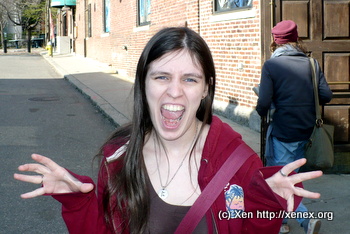
| |
|
|
Not one hundred feet from our front door, Amber's car's check engine light glows. We cannot possibly proceed to Salem with this looming and unspecified threat - what we days later discover to be no more than a faulty oxygen sensor, but we cannot not take the risk. We retreat, load our luggage into my car, and start out again, only to find that the GPS wishes to take us exactly the wrong way. We navigate thirty miles by logic, memory, and cell phone before the gadget rights itself.
If I were the sort to ascribe malevolence to inanimate objects - and I am, it's called "resistentialism" - I would swear something wants us close to home, not to spend a few days on the ocean. However, the time for omen-based cancellation is days passed. I am not about to pay to not go on a trip.
There lingers a sense of unreality to our drive up. We sing to the radio and listen to the first part of my Good Omens audiobook as a counterbalance, but I cannot help the sensation that something is awry. When we pull into a rest stop, I can't help feeling we are being watched, not by some predatory force, but by a curious outsider who is considering what bits of the experience so far ought to be spliced into the road trip montage.
Luckily, the trip is as uneventful as a traveler can hope for. We pull into the driveway of a barn red building that screams quaintness. As we exit, we see a white haired man, who approaches the car with curiosity and smiles. I extend my hand and greet the man I presume to be one of our inn keepers, Bob or Marcel. We knew little about the inn, but assumed from the rainbow flag on the inn's webpage that our hosts are partners in more than business. The man endures my greetings for a few moments more, his smile growing more perplexed, before he directs me to his son inside, as though it should have been the most obvious fact in the world that he is not a homosexual innkeeper.
Bob - when we find him - has an unmistakably Canadian accent, the sort that always sounds somewhere between an excited dog greeting a new friend and an apology for an unnoticed slight, which works in his favor as an innkeeper. He directs us to our quarters - a small room on the second floor, with a private porch entrance - to get settled and goes to tend to a newly arriving guest.
Amber quickly sets to work obscuring the vision of several of the colonial themed dolls that adorn the room, before we can properly blind them with our affection. I unpack sloppily, claiming swaths of the wooden floor with my bags and clothing while reading over the various rules provided to us: We mustn't use the provided television before eight in the morning or after eleven at night, and even then it must be kept very low so as to not disturb the guests. (Not, of course, that there would be much of a point as the set gets only a few channels; one does not come to a bed and breakfast in New England to watch television.) Breakfast begins promptly at eight thirty and ends at a sharp ten, after which guest are kindly invited not to bother the innkeepers with their grumbly bellies. There is complimentary water in the mini-fridge, a computer we are welcomed to use if we do not too terribly mind Windows Vista, and a coffee maker. Signs in the bathroom ask us to save the planet (read as: the inn's water bill) by refraining from requesting new towels and sheets, though I choose to believe Innkeeper Law (or the health department) insists the beds have all new linens before I can see the room. Should there be a fire, there are several obvious exits. If we fail to utilize them, we are kindly welcomed to keep our burning to death to a dull roar.
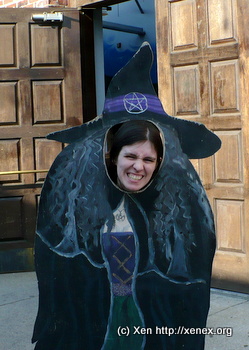
| |
|
|
While perusing for suggested fines or loopholes, I overhear Marcel directing the new guest to her room and suggesting some activities in town.
"Oh no," she says, "I am going to stay in my room and finish writing my book. That's why I'm here."
Instantly, my dander is up. We writers are territorial sorts and I growl to Amber speculation about what sort of book she could be writing and asking what sort of person takes to a bed and breakfast to work on a book when a secluded and dank hotel room would be far less distracting. To my paranoid writer imagination, she is intending to pen a bodice-ripper or the next Twilight and is here to steal my inspiration and make me feel guilty for my recent indolence, as one does.
"A rich one," Amber suggests to my question and I cannot deny the truth of it. This bed and breakfast, the Morning Glory, is more expensive than most others we looked at. I am not actually sure why I thought we needed a bed and breakfast when a hotel would have been perfectly serviceable - we are capable of foraging for our own breakfast - but we selected it nevertheless and uncharacteristically. All of this adds to the sense that we are perhaps meddling in a fate which was not originally ours and is being hastily tailored on the fly.
This first evening in Salem is given over to getting the lay of the land. It has been several years since either one of us has been here. Our respective memories are rusty and could do with a bit of brushing off.
We poke about the cemetery, as tourists must, noticing the unambiguously Pagan people reverently caressing the centuries old tombstones.
"Do you feel anything here?" I ask Amber as neutrally as I can manage.
She considers the air for a moment. "No... nothing more than I would in any graveyard."
"Right, exactly. Salem has become this... Mecca for Wiccans, but no witches died here. Aside from Tituba, nothing like witchcraft was practiced anywhere near here in colonial times. It was a bunch of bored Puritans who thought killing their neighbors at the behest of teenage girls was a fine, Christian form of entertainment. These weren't my people, but now Pagans gravitate here because of... of an advertising scheme based on political murders. It would be like Jews intentionally moving to Auschwitz."
"They visit. And they did die there," she says, because I have not made my point well.
"Yes, but they don't pose behind plywood cutouts of 'storybook' Jews, with peyas to their knees and hook noses. They don't have kitschy museums where tourists can watch a real live Jew conduct a Jewish ritual," I say, motioning to the nearby Witch Museum that offers both of these for witches. "My beliefs do not exist to be milked for tourist dollars."
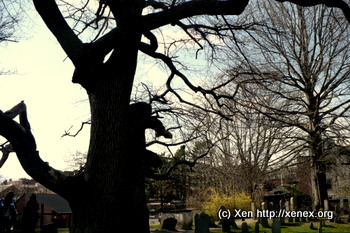
| |
|
|
Amber is too polite to remind me that my beliefs apparently do exist for this reason, as I am visiting Salem and not another tourist trap because we happen to be witches.
Everywhere tourists are encouraged to go has a red line leading to it. There is a distinct feeling - nothing any local says to us, but an undeniable sensation - that it is assumed tourists have no business leaving their lines. Being a touch oppositional, I want to go to the least touristy place I know of in Salem, somewhere actually authentic.
I try to lead us to Gallow's Hill, the site of the Puritan hangings. Amber's phone will not oblige us by giving us directions, though it may be simply that we are asking it in the wrong fashion, so we instead wander in concentric and intersecting circles without finding any landmark I can recognize from my jaunt years ago.
Our lack of direction is at one point so bad that we look at a street map to find the statue of Elizabeth Montgomery portraying Samantha Stevens from "Bewitched", wander for two miles, then find ourselves back at the map. It is only then that Amber looks across the street and notices the statue, her bronze grin mocking us.
Walking the town at night, listening to the traffic and the surf, I have a pleasant sensation of rootlessness (and not simply because I delight in being lost when my salvation is no more difficult than a painted red line that will eventually place me back before my inn). It is not necessarily that I wish to live in Salem - it is a lovely, small city and I do not doubt I could - but that I do not need to live where I do. I love my family and like being near them, of course, but I do not feel my fate is in Red Hook (however often my novels find this town as the center of their gravity). I could shake loose the soil of the Hudson Valley and sun my metaphoric leaves on beaches or rooftops, so long as I am nowhere too rural or urban. So long as I have Amber lost beside me, fidgeting with her phone until it tells her where we rest our heads tonight, I think I will be home.
We wake the next morning and head down to breakfast half an hour after it had begun - we are not on a vacation to get up any earlier than is absolutely necessary. Aside from the blonde writer I overheard last night, there is a woman of comparable age with the air of a snarky librarian seated beside an older and jovial man (the sort who one cannot help but imagine has lustily told personal anecdotes about nights with Marilyn Monroe), across from a ostensibly slightly younger man in owlish black glasses, avidly discussing some minutiae of his deceased grandmother's life as though it were a recap of his favorite movie.
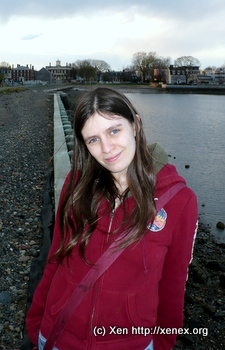
| |
|
|
Amber and I slip into chairs near the writer as Bob asks us if we would like tea, to which we nod. As he brings us individual porcelain teapots, Amber and I assess the quality of the breakfast. One of the reasons we chose this place was that the food looked amazing, in contrast to the store bought bagels and other traditional fare of the continental breakfast I remembered from the Salem Inn years ago. There are baked beans with bacon, a bread full of nuts and fruit, another cinnamon bread with chocolate chips, and yogurt and granola. I take a slice of each bread and make myself some yogurt, intent to fill up as much as possible on included before we continue our wandering.
The bespectacled man, Alan, speaks with few pauses for half an hour. He has so many details told so theatrically that I later wonder aloud to Amber what embellishments have been sewn on for the sake of the narrative. The other guests are keenly enthralled but I, not being the owner of an Italian grandmother living or dead, just analyze his stories for omitted footnotes and allusions to books I may have read. He has a new story for every question put to him, from her yards long rope of pearls with which she went to her grave, to her generous bosoms, to her disdain for the Southern Italians. He mentions, perhaps tellingly, that he has no such stories about his mother. "I know her maiden name, nothing more."
Into the second half hour, the snarky librarian, Beverly, makes mention that Alan is the curator of the House of the Seven Gables next door, where she will be speaking this evening on power dressing in the eighteenth century. Beverly is herself a curator at the Smithsonian Museum in Washington, DC. Her vocation (or avocation, since Amber believes she overhears Beverly say this effort is voluntary) is to photograph all the lace elements in the displays and make sense of them. For me, this would be a curious tedium, but one is given the definite notion that few things are more interesting for her. Lace, she informs us, was the jewelry of its day (she uses the word "bling" several times, but there is mild disdain in her voice, as though she might simply be using it because she mistakes both Amber and my ages and level of connection to urban culture). Some lace could be worth the equivalent of three thousand dollars a sleeve and women would go out of their way to wear five or six sleeves to demonstrate their ostentatious wealth. All this time, I assume lace was just a bit of fluff at the end of shirts to look particularly fancy, but I find myself interested.

| |
|
|
Her husband, Peter, prompts her when she tries to politely demur. This prodding has the air of a dynamic to which they are quite accustomed. She patently has a frighteningly deep knowledge of a subject about which few people are even aware exists. He seems to love few things more than getting her to expound in detail, which charms me. I am all the more won over when Beverly, perhaps feeling he is boasting of her too much before strangers, explains that he happens to be one of the foremost authorities anywhere on Sherlock Holmes. If you are a lace curator, who else but a premiere Sherlockian do you take for a partner?
Eventually, the assembled breakfasters asks what Amber and I do, assuming us to be college students. I tell them that I work with adjudicated minors in a kiddy prison and am a novelist. "What sort of novels?" Sandy - the blonde writer - asks. It turns out that there couldn't be less competition between us, as she is writing a psychological parenting book, having raised a comedian, a musician, and "one who has a job".
"Contemporary fantasy," I say, adding by way of genre clarification, "Do you know Neil Gaiman?"
Beverly and Peter say that they do and I tell them that he is the one who is always two steps ahead of what I want to do. In my first novel, I created a character - Wick - who was the dour and taciturn son of the African god Anansi, as I assumed this was a sufficiently obscure god. Before We Shadows could be published, Gaiman published Anansi Boys, a novel I refrained from reading until I was well and truly done with my book, which stars the sons of Anansi. (Fortunately, our characters ended up very different, so I feel no worry that anyone would find Wick derivative.)
"We actually know Neil personally," Beverly corrects from my misapprehension. "And I have bad news. He sent us a letter, telling us that he is giving up email so that he can write more."
Of course. Of all the people in the world to which I could have divulged this, I had to mention my envy to Neil Gaiman's personal friends. And of course Neil Gaiman would be friends with a lace curator and a renowned Sherlockian.
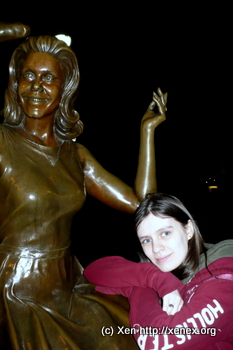
| |
|
|
Upon my revelation that I am not simply an author, but a serially published one, Beverly mentions that she has a friend who collects signed books with suggestive inscriptions - "Last night was fabulous" and the like, but nothing overt - and says she will have to have me sign my books as such the next time we meet. I cannot deny smiling at the thought that my life my again intersect with those of such fabulously curious people.
There is a certain class of people who decide to fork over oodles of money for a mid-week, New England get-away at a bed and breakfast. Moneyed and rather educated would be a far assessment, and I feel like neither in their company. If one has the resources to pursue this manner of leisure, it is a far bet that one has the ability to devote oneself to such narrow fields of focus as lace and the works of Sir Arthur Conan Doyle, that one has managed to raise a comedian daughter who is getting flirtatious texts from Charlie Sheen after roasting him and is now writing a parenting manual. With infinite resources, I can't quite imagine what level of peculiarity would become my life's focus, but I would definitely publish more than a book a year.
Before Alan leaves, he invites Beverly and Peter for a private tour of the homes next door. As breakfast is being cleared, I sidle over and ask Beverly if Alan would mind terribly if I should try to invite Amber and myself along. She hardly thinks but she assures me that this should be fine.
We pack my satchel full of sandwiches, jerky, popcorn, drinks, both to defray some of the rising costs of this holiday and so as to have no need to stop our activities for lunch.
We make our way to the Salem Witch Museum, at least partly because it is the most visually striking and therefore (it is hoped) more authentic of the offerings, occupying what seems to be a decommissioned church. In the few minutes before the doors open, I try to scribble down notes of what I should be writing about the trip so far. I can tell this is all supposed to be important, but do not yet know the direction it will end up taking. Things are brewing.
When the museum workers let us in, we are treated to dummies whose vignettes light up as we hear voices overacting scenes from the witch trials. I've seen this spiel at least twice before and, even if there are changes, I wouldn't remember. The story of the witch trials is drilled into the heads of middle schoolers, so I would fill in whatever has been modified or omitted.
After this, one of the workers brings us into a room with more dummies, these meant to represent witchcraft today. It goes from a medicine woman of old, to the Wicked Witch of the West, to a couple of mannequins dressed as Neopagans. It is all overly apologetic, as though Pagans today might choose to hold a grudge against the great, great, great (many greats) grandchildren of the sole unrepentant judge. For one thing, the Burning Times in Europe were exponentially worse (supposedly in the hundreds of thousands to millions compared to Salem's sixteen). For another, the Neopagans are so embarrassingly accurate in their velour cloaks and pretension that I have a far more modern and specific grudge I do not voice owing to my embarrassment.
"Would it kill them to put the male in a business suit? We can manage to do without Hot Topic," I grouch.
"Or go in the other direction and have them be skyclad," suggests Amber.
"Exactly. Go all the way."
We realize our time is growing short before Alan's tour and dart to the Peabody-Essex Museum (being in love with an artist, I know that it is impossible to avoid going to museums if one happens to be in walking distance). The docents all but growl at me within seconds of paying admissions that I need to check my bag, meaning I will be unable to dine while surrounded by nautical art. I can't imagine what harm they think my satchel is doing, but I have neither the time nor the temperament to argue the point.
As has been chronicled, I am finicky when it comes to art. It must resemble what it is supposed to represent, and yet not be boring. Old ships rigging and model ships are not art. Teepees made of Christmas lights, the floor of which is an animal skin being projected with a student made gay porn (sensitively featuring very white people acting stereotypically Native American, because... commentary, man... whoa), is not boring but it is also not compelling or original enough to call art. There are a few exhibits I want to see in a bit more detail (some puckish looking Native American trolls, a whale skeleton made of lawn chairs, a body modification photo with beads instead of blood, a piece from a Native artist tired of being asked to participate in "spirit" events heartily telling off galleries), but we don't have enough time before we must eat and get to the House of the Seven Gables, with promises that we will run back to the museum to finish our visit afterward.
Outside the museum, we sit on landscaping boulders and break out our meal. The day is a bit too cool and I already feel this trip slipping through our fingers. I look around to try to actively take it all in, so I can remember more vividly.
A man dressed as a ghoulish clown roams the streets. No one seems to pay him any mind, underscoring the idea that he is just one of those things that happen daily in Salem. What on earth he has to do with anything is beyond me, aside from a vague "witches are suppose to be scary and clowns certainly are" vibe that gives license for there to be three haunted houses within three blocks. When he circles back, he commiserates with a bus tour guide, who himself is busily trying to chat up a Russian tourist, either to take his tour or give him her number.
Sated by our quick lunch, we arrive minutes after two and I am relieved to see that Peter and Beverly are still in the waiting room, assuring the woman behind the desk that they are Alan's guests and need no more help from her than for Alan to appear. At Alan's name, she offers them tea or coffee, as though his name is enough to frighten them into unnecessary subservience. As we wait, Beverly speaks to us about the displayed lace bobbins, which suggest that lace making was such a tedious undertaking as to cause any amount of money to be too little for me to want to take it up. She then regales us with a lace related riddle about a ten inch slip of lace collar that perplexed the Smithsonian. "Do you know what it was?" she asks, smiling at the coming punch line.
All I can think are dirty suggestions for what on the human body could be about ten inches and opt to say none of these, but instead look at Amber and hope she can come up with something less inappropriate.
"A choker!" Beverly says, to my relief.
Peter interjects some of his interest in Sherlock Holmes. Aside from a quick reading of "The Tale of the Speckled Band" to clarify a baffling play put on by the drama club at my school for the learning disabled and decades ago read of "The Hounds of the Baskervilles" ("because I heard it was the spookiest of all Doyle's stories," I tell Peter and feel cowed by my own seeming lameness), the extent of my knowledge of this literary figure falls to the general saturation of pop culture. Sherlock Holmes is one of those figures everyone knows about, but not many people bother to read. I have avidly watched the first two series of the BBC program, and try to steer the conversation in this direction so as to not display my gross ignorance of a subject about which this man is far more than conversant. He seems not to mind that I know little about Holmes in detail and I am again relieved to have not made an utter ass of myself before people I somewhat liked and respected on sight.
Peter spies a flyer the museum made for Beverly's talk that evening and is jubilant. "Your first eight-by-eleven!" he proclaims, nearly launching it into the air in his joy. "We should have this bronzed."
I give a laugh and he explains that this is eminently possibly, involving acid washes on aluminum plates, much as is done on trophies, suggesting his idea is not said merely for emphasis.
When Alan comes out, he informs us that his lateness to meet us has to do with the fact that he just put in his resignation, effective at nine tonight, after Beverly's talk. I feel awkward to have imposed myself on what has turned a bit solemn, but he does not seem to begrudge our presence. Still, my urge is to hang back and listen rather than participate as fully as Peter and Beverly, both of whom can at least claim to have a working knowledge of Hawthorne's book.
Alan explains the intentions behind every design element, a sharp contrast from the snippets of rote memorization I overhear from the tour guides. For so many of the carefully laid out rooms, he says that they had actually been closed up or full of irrelevant furniture. Hawthorne's furniture was on the property, simply left in attics rather than on display. It was his idea to recreate the rooms as mention in Hawthorne's romance House of the Seven Gables, as Hawthorne was inclined to discuss details such that a single description could take up several pages. I am taking Alan and Peter at their words about this, as the only Hawthorne I had ever bothered to read was "The Minister's Black Veil", and only then because I was teaching it.
Peter and Beverly inquire about this or that scene from the book. Amber and I follow in mute silence, intrigued but ignorant, especially when Alan implies that Herman Melville had or desired to have a more than friendly relationship with Nathaniel Hawthorne. The only time I open my mouth for something more substantive than a "wow" is when I notice a card explaining that Hawthorne's wife, Sophia Peabody, burned almost all the letters he had sent her. "Why would she do this?"
"Because she was an idiot," Alan says dismissively, but then amends that it was more likely that the letters were simply not intended for eyes other than hers. I formally grant permission to future biographers to root around my old hard drives for information that will elucidate my character, so long as they judiciously ignore any porn accumulated when I was a teenager and which may lie dormant on dead hard drives.
Unable to satisfactorily thank Alan for our addition to what was meant to be a private tour for his friends, we bow out when the tour is at an end and he hints he is going to rest before the talk tonight. Time has grown short before the Peabody-Essex closes, so we all but run there to dash through the exhibits before the docents boot us out the front door. In the process of this, we end up walking up a back staircase and find ourselves before a woman making the final preparations to turn a floor into a dance hall.
She takes no notice of us at first, so I walk up to her. "Are we, in the strictest sense, allowed to be here?"
She considers my presence before her, as though I have just materialized but that she is quite used to this. "No. You aren't," she says slowly, as though she does not really mean it but is supposed to say this.
I feel that, if I apply a little pressure, we will be invited to crash some gala to which we will be underdressed. It is just that sort of trip, where we end up wiggling our way into places to which we are not invited, but nevertheless should belong. However, we have other plans.
We sneak into Beverly's talk "Power Dressing in the Eighteenth Century", again slipping by anyone who might keep us out of where we feel we belong. It does feel a little odd to be crashing a lecture, but I am drawn to finagle more time around Beverly, Peter, and Sandy (who emerged from her writer's cocoon to take in the lecture and who emphatically waves from across the room). Beverly and Peter are pleasantly startled to see us, as though we would miss this simply because we happen to be in the Witch City. I will not bore you by trying to recount the talk, except to say that Amber and I were remarkably captivated and that alone is a testament to Beverly's passion for this arcane subject. She was so authoritative and cunning that she caused a few colonial reenactors in the crowd (who likely forked over the $15 admission that Amber and I neglected simply by walking in as though we belonged there) to huff and fail to trip her up with their pointed questions.
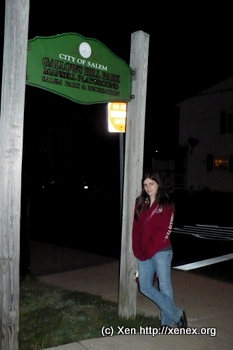
| |
|
|
The night is not exactly young when we emerge from the talk, but it is warm enough that I ask Amber if she would mind having another go at finding Gallow's Hill. This is, after all, our final night in Salem and I will feel unresolved if I have not made the pilgrimage, however much I acknowledge that the Puritans were not my people.
We walk for miles to Gallow's Hill. I will later realize the journey felt so much more direct because the inn at which I last stayed is a mile and a half nearer. We stroll through what must constitute the ghetto of the city, abandoned factories and rusted cars, torn open fences that just scream "opening scene of a zombie movie", discussing our life and the relationships of our friends to distract from the idea that we are following the hunch of Amber's dying cell phone and trusting we will be able to deduce the way home without it.
We take the creepy walk up a dark hill, my hands raised in the non-defensive posture drilled into me at work, in case a Salem teen should be intent on getting jabbed in the nose for the sin of jumping out of the woods at us. None does and I am hardly ungrateful to avoid the need to defend myself and my loved one.
Having reached the apex, I expect something a bit more startling, even though I remember the playground well enough from my last trip to Salem. It is eerie, yes, but would have been exponentially less so had I been ignorant of its history. Though, knowing this hill was chosen by "good Christians" to display swinging corpses for miles around, it is a bit unnerving to see strands of black ribbon tied to the nearby tree, what I do not feel I am incorrect in assuming are references to the killings. I walk Amber over to where I imagine Gallow's Hill's infamous hanging tree to have been, which is now a basketball hoop. Someone has helpfully spray painted the word "TREE!" on the metal pole, ostensibly validating what I assume. Having come this far, we have to admit that there is little more to be seen and we are reticent to be seen ourselves. The journey was the point. Though tourism keeps this town afloat, I do not doubt that the cops are less generous in dealing with trespassers, even trespassers in the midst of polite funereal rites (which have been done so often by so many as to render ours a drop in the metaphysical bucket).
We wake the next morning for a final breakfast at the Morning Glory. Alan, who is not in fact a guest at the inn, is not present this time to again thank. Marcel places before us pancakes drowning in maple syrup and covered in sliced bananas, strawberries, and crushed walnuts. Must we ever go home?
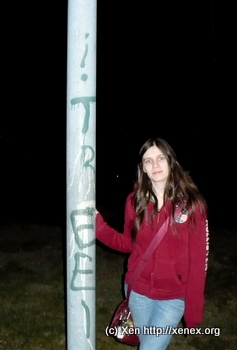
| |
|
|
Bob listens to we five talk as if we are old friends, even though this is literally twenty-four hours after I have properly met any of them. I envy him his innkeeper position, though I cannot imagine all this guests are so inclined to conversational cooperation as we. Still, every morning, he gets to listen to strangers (in a certain tax bracket) unfurl their life stories for him over orange juice. It must be better than all television and most books. He does not have to be much attached, because we go away after a day or so. No time to wear out our welcome and we are somewhat paying him to listen.
Sandy mentions, apropos a seconds long lull, that she visited a fortune teller last night. She begins almost embarrassed, then corrects that it was not one of those "spooky, witchy" places, but one filled with mentions of angels and light. Given where we are, this is perhaps not the most tactful of distinctions, but we let it slide. I squeeze Amber's hand under the table and shoot her so quick an amused glance that I am sure it has not been noted. Sandy goes on to detail the reading, assuring us that it did not seem at all like a cold reading (a professional reader in Salem, as they require posted certification, would not be so amateurish as to fall victim to blatant hucksterism), but that the reader - Dmitri - says that she has adult children and that she is eager for them to have children of their own. I cannot begin to imagine how he managed to guess this.
Sandy and Beverly detail their own experiences with personal clairvoyance - including Sandy becoming quite irritable with a coworker who projected thoughts into her head in order to get a free muffin - while Amber and I quietly finish off our breakfasts.
We are gently pushed out of the dining room so that Marcel can clean up after us, saying that we are welcomed to continue our conversation upstairs. This turns into what Beverly and Sandy label a couple's therapy session.
Sandy tells us how she wept at meeting her son's new girlfriend for the first time, so profound was her joy at meeting this woman about whom she had heard so much and whom she loved on sight. "I gave my son my engagement ring and my mother's wedding ring to give to her. I meant for him to have the diamonds taken out and put in a new setting. When he got back from the trip, he handed them to her and said, 'My mom wants you to have these.' She and I have talked about it and have decided we might be engaged."
After we are done laughing, this segues into the story of Peter and Beverly's love. When they met over a shared love of Sherlock, Beverly was married to and rather enamored of a NASA jet pilot (because of course a woman like Beverly bags a jet pilot prior to catching the eye of the foremost Sherlockian). Peter valued her highly, but was never untoward. A while after her husband's untimely death, there was a mutual and unspoken acknowledgement of their feelings but Beverly felt she was done with romance. She finally relented after years, citing that she truly did love Peter and wanted to stay with him (despite his being sixteen years her senior).
Peter offers the advice, "There are three people in your life: your great love, the one you want to have children with, and the one who you can spend the rest of your life with. If you find that last one first," he says, touching Beverly's knee lightly, "you have it made."
Amber and I excuse ourselves to tidy our room up so as to not run afoul of the checkout time. As we are returning our keys, Beverly catches us at the door. "Sandy and I talked it over and we have decided that you two belong together, so good luck. If you are ever in Washington, I want you to look us up. Just find any Sherlockian" - a feat she seems to assume will be simply - "and tell them to take you to Peter." Off my doubtlessly politely amused smirk, she adds, "Peter is a much bigger deal than he lets on. He has given speeches all over the world on Sherlock, that's why he is so encouraging of my talks."
As we drive home, I begin to cry so silently that Amber is startled that my face is wet. It is not that I am sad at all, but rather just processing latent emotions to get toward catharsis. I do not miss Salem or mourn that the trip is over. It needs to be. I realize how unaccustomed I have grown to being with someone who so untroubles me, someone with whom near strangers feel I belong.
As you might imagine, the logic of my tears does not quite make sense to her (as it does not to me as I write this later), but she accepts it. It has been a peculiar trip on the whole and my outburst is hardly the strangest moment.
Soon in Xenology: Male friendships. UFO Book Signing. Renee. Merrill.
last watched: Blade Runner
reading: Secret Rituals of the Men in Black
listening: Feist
The Knot ««« 2012 »»» Having Written
Thomm Quackenbush is an author and teacher in the Hudson Valley. He has published four novels in his Night's Dream series (We Shadows, Danse Macabre, Artificial Gods, and Flies to Wanton Boys). He has sold jewelry in Victorian England, confused children as a mad scientist, filed away more books than anyone has ever read, and tried to inspire the learning disabled and gifted. He is capable of crossing one eye, raising one eyebrow, and once accidentally groped a ghost. When not writing, he can be found biking, hiking the Adirondacks, grazing on snacks at art openings, and keeping a straight face when listening to people tell him they are in touch with 164 species of interstellar beings. He likes when you comment.